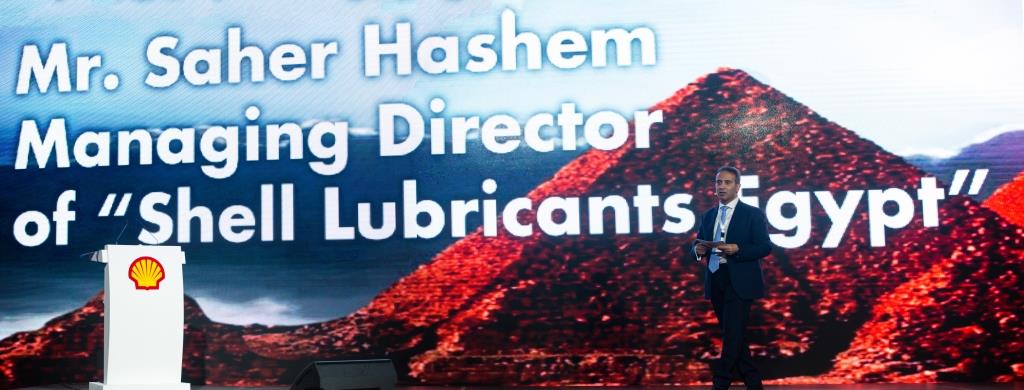
More than 100 leading companies and authorities in their fields joined host Shell Lubricants Egypt to pioneer best practices in solving the world’s greatest energy challenges now and for future generations
November 18th, 2016, Hurghada, Egypt: Hundreds of Egypt’s top companies, academic institutions and entrepreneurs partnered with Shell Lubricants Egypt and energy experts to explore global sustainability innovations at the fifth annual Shell Technology Leadership Conference (STLC) on November 17-20, 2016. The summit, which undertake the theme “Energy – Water – Food: Innovation and Collaboration for Egypt’s Future Challenges”, took place at Steigenberger Al Dau Conference Centre, in the nation’s premier Red Sea destination, Hurghada.
The planet’s energy, water and food systems comprise a tightly interconnected nexus. Water is a vital component in almost all energy production while energy is needed to treat and transport water; and both water and energy are necessary when cultivating food.
Therefore, all three areas must be sustainably managed in order to shape a future where energy remains an abundant resource for all. Shell’s overarching goal of the conference was to foster cross-sector collaboration, as technological leadership will be essential in helping meet the world’s future energy needs. Attendees were also tasked with discussing sustainable solutions to meet challenges presented by energy-water-food stresses.
Keynote speakers included Mr. Aidan Murphy Shell Egypt VP, Country Chairman & Managing Director; Mr. Saher Hashem, Managing Director Shell Lubricants Egypt; Dr. Andrew Hepher, Vice President of Shell’s Downstream Global Commercial Technology; Dr. Tarek Tawfik, Deputy Chairman of the Federation of Egyptian Industries; Mr. Wael Fakharany, Managing Director of Careem Egypt and Senior Vice President Government Relations, and Dr. Khalid Ismail, Founder and Chairman of Klangel.
Fakharany presented some of the world’s most groundbreaking solutions in several fields including electricity and energy production. For example, energy visionary Makani is building more cost-effective floating wind power turbines to replace traditional wind farms and many more solutions.
According to Fakharany, the best ideas come from learning important lessons when innovators fail. “Innovation has a long history in failure. So embrace it and learn those hard lessons. Treat your idea or invention like you would a startup, all the while staying focused on having a real impact on your communities, and maybe the world at large.”
In a similar vein, Shell VP of Downstream Global Commercial Technology, Dr. Hepher spoke about Shell’s commitment to investing heavily in alternative and clean energy projects to mitigate the effects of climate change. Shell believes achieving a carbon neutral society means organizations will need to make major gains in efficiency and new technologies, such as renewable energy and carbon capture and storage systems.
“We at Shell believe it is our responsibility to be leaders in this field as we fully appreciate the globe’s need for efficient solutions that exceed our customers’ expectations. Our job is to save you money, time and trouble when it comes to running your business. Summits like this are a fundamental part of promoting collaboration that will eventually produce new and exciting technology to help meet the energy challenge,” said Dr. Hepher.
Dr. Tawfik from the Federation of Egyptian Industries gave perspective on the seriousness of the world’s food issues. After, he discussed novel ideas designed to change how we eat, grow and monitor our food supplies, including desalination nanotechnology, waste and biofuel recycling, portable solar pumps, hydroponics, food & water sensors and beneficial microbes.
“Every year 1.3 billion tons of food is wasted worldwide. New innovation & research in food security is promising, and major advancements in this area are projected to materialize over the coming decade. Innovation will be a game changer & with all the challenges forcing Egypt, it will be interesting to envision how we will fit in the global picture.” Said Mr. Tawfik.
Nour El Assal, CEO of Tagaddod, is one such innovator. His homegrown Egyptian company is constructing the first regional facility that transforms food waste into biodiesel.
“At Tagaddod, we see waste as humanity’s chance to reintegrate in a universal sustainable system. Think of replacing oil reservoirs with the waste of the world,” said El Assal.
Building on this idea, Lifesource’s CEO Mohamed Samir discussed global water issues running the gamut from mismanagement & misuse, water poverty, mechanical meter issues to increasing costs. Lifesource is looking to change this via the Lifesource Smart IoT System, which consists of smart meters, alarms and database control servers designed to improve water management.
“By using smart water system depending on IoT and ultrasonic sensing technologies, we will manage, monitor and control water resource in residential, governmental, industrial and commercial sectors to rationalize consumption, detect leakages, protect users’ entities and homes from sinking, and save monthly billing. We feel that this is going to disrupt the marketplace, allowing us to gain 25% of the Egyptian market by 2020. We offer customizable analysis and solutions for clients big or small for effective interaction with his water network to reduce non-revenue water and take instant actions regarding any unusual behavior regarding his network like pipe burst or damaging or even water theft. We will deploy this smart system for more countries across Africa like Ethiopia, Kenya, Sudan and, South Africa that suffers from water problems mismanagement, misuse, leakages and water poverty,” says Samir.
Finally, Saad El Gyoshy, former Minister of Transport, discussed innovations in concrete pavement manufactured by CEMEX Research Group. Not only does concrete pavement last longer, it also has lower life cycle costs, less heat retention/light reflection and superior aesthetics.
“Concrete pavement is the next big thing in road construction for Egypt. It’smuch more reliable than conventional asphalt, and beneficial for Environment and energy savings,” added Dr. El Gyoshy.
“Together; through current and potential strategic partnerships, I hope we can use this forum as a springboard for coming up with practical innovative solutions that would positively contribute to Egypt’s energy future, which is also in line with the country’s strong drive – demonstrated by the recent economic reforms – to help meet the energy needs, therefore providing a better life for Egyptians, “Concluded Murphy.
“STLC centers on Egypt’s many success stories in the arenas of innovation, sustainability and energy. It is clear that Egyptian entrepreneurs are at the forefront of this technology after seeing our guest speakers in action. We are certain that the weight of Egypt’s business sector will render Egypt one of the most important innovators of energy solutions, and our role today is to promote collaboration between established firms and smaller startups looking to gain a foothold in the market. This market must stand on its own two feet if we are to see a bright future for generations to come,” concluded Mr. Hashem of Shell Lubricants Egypt.
Shell Group is a world leader in the research and development of renewable energy solutions. Between 2011 and 2014, Shell spent over $100 billion to support new power production. Earlier in 2016, Shell launched New Energies, a Shell subsidiary focused on investing in renewable and low-carbon power projects.
